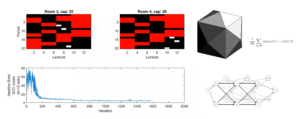James Sakal is a second-year PhD student based in CEMPS, Streatham Campus. His research is in the field of timetabling optimisation.
One year ago this week I arrived in Exeter to begin a PhD.
It was a busy, exciting time with lots of unknowns. Twelve months on, I’d like to share with you some of the most valuable insights I have gained about being a PhD researcher at the University of Exeter. Before I begin though, a couple of caveats. Firstly, this is a COVID-free post. Secondly, I have tried to make my bullet points as broadly applicable as possible, although I can only speak from my personal experiences working in computer science. I hope my tips will nonetheless be useful to others beginning PhD journeys in other fields.
- Keep a log of your progress. I write an on-going diary of everything I do, including efforts that seem like dead ends at the time but could prove invaluable later. I find an informal narrative style works well, peppered with links, details and meaningful key words that can be searched quickly. Not only does this archive your thought processes and actions in a chronological and readable way, but it is also a good habit to get into. A successful thesis is essentially a story too.
- Think big – and small! You may be naturally inclined towards being a details person, or more of a project managing type who oversees the bigger picture. A PhD however requires you to have a handle on both ends of that spectrum and everything in between. It is easy to get immersed in the intricacies of your project, but just as crucial to maintain perspective on where everything sits within the wider body of your work.
- Manage time realistically and efficiently. PhDs naturally ebb and flow in terms of productivity. Accept that progress likely won’t be made at a constant rate and that trying to force something with a tired mind is perhaps not the smartest use of your energy. Taking breaks is just as important as exploiting/mining a rich seam of productivity when it hits. Set achievable short-term goals and allow a flexible, organic structure to your day. When in a good flow, it can be beneficial to work a little longer in order to finish annotating a particular paper or fixing a block of code rather than interrupting the process.
- Organise your materials. Use descriptive and precise labels when naming files and folders (avoid “REALLYFinalNewWriteUp2.doc” for instance) and develop an indexing or colour coding system that suits your needs. Establish a regular backing up regime too so that you don’t fall victim to unexpected data calamities and risk losing important work. For academic papers, referencing software like Mendeley, Zotero and Endnote are very useful.
- Find a life balance. Don’t neglect other areas of your life such as exercise and socialising. Having outside interests can often enhance focus on your work rather than detract from it. How best to attain this balance depends on your particular situation and is likely to be an iterative process of trial and error.
- Take advantage of the rich variety of opportunities at Exeter. For example working part time as a teaching assistant, engaging with the researcher development programme, participating in seminars and reading groups, improving or learning new professional skills, presenting your work in different environments and networking with others in your field. The academic community at Exeter is both a friendly and supportive one.
- Have confidence in yourself and your long-term plan. Compared to an MSc or MA, a PhD is a slow process. Your personal growth as a researcher may be imperceptible day to day but that doesn’t mean it isn’t happening. By keeping faith in your abilities as an independent researcher, you can stay on track and avoid the dreaded ‘imposter syndrome’.
- Communicate your issues. If you encounter issues don’t be afraid to speak about them. Exeter offers a sympathetic support structure, from your supervisors and colleagues, to well-being and counselling services, so there is no reason to feel isolated or unheard.
- Finally, experiment and find what works best for you! One of the most wonderful aspects of PhD research is the freedom to pursue your area of interest in your own way.
I have much yet to learn in my PhD, but for those just starting out; welcome! I hope you find your first year as rewarding and interesting as I have done.
Written by: James Sakal
Website: http://jamessakal.com/
YouTube: https://www.youtube.com/channel/UCO-eXh-_nuOMOe6VnirGKrw
Instagram: https://www.instagram.com/james.sakal/

